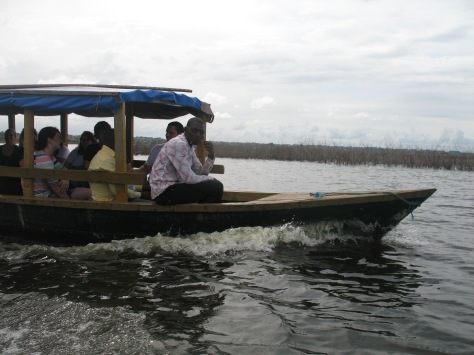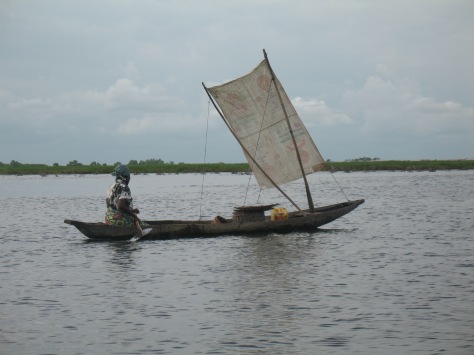
It’s rare for people to write about Ganvie, or really any part of Benin, but when they do it churns my stomach. Romantic, they write. Mystical, inviting, the Venice of Africa.
None of this is what I saw in Ganvie.
We got to the stilt village in the middle of Nokué Lake, not far from Cotonou, Moving in a pair of long motorboats we passed fish farms and what looked like the invasive species water hyacinth along the way. Because we were a human services group, someone asked the obvious question of whether the men who brought us there were from the community, and the answer was hand-waved away with a probably. When we arrived, we got out to find a small, angry monkey chained to a post, setting the tone for our visit.

Reasons given for the existence of the village are varied, from the villagers themselves as well as the internet. Some claim it started 400 years ago, others say the 16th or 17th century. The Tofinu people were running from enslavement by either the Fon or Dahomey tribe. Or was it the Portuguese? Some claim it’s the only one in the world, or perhaps the biggest.
Everything felt uneasy there.
A woman screamed at us in a tribal language as we came to a shop. Throughout the day, children and adults would curse, yell and point at us as they passed on their completely non-mechanized boats. Even for those who didn’t speak French, it still had a chilling effect. We found ourselves lowering or hiding our cameras, not meeting each other’s eyes or theirs.

After I made my purchases I was tired of being pressed further, so I went to the porch to watch some kids splash around. They were all quite small and in various states of undress, but were too engrossed n their play to bother with another bunch of yovos. I took a couple of pictures, as did some others, but one of our flashes went off and a little boy put his hand over his genitals. In French he yelled that he would only remove it for money, which horrified us. Then he said we should really pay so we can have National Geographic pictures, and I was horrified for a different reason. This kid knew our number, knew the number of everyone who pays a boat to take them out there. We wanted something gritty, graphic, exotic and strange. Something that looked like a poor, primeval stereotype of Africa.

We were brought from one building to the next, and it quickly became clear that there would be no talk on the history or culture of Ganvie. Just a lot of wooden statues, wind chimes, and toy cars for sale.
Some students began to get seasick from getting in and out of the boats so often, and others were nervous about a couple of the buildings that seemed to bounce and sway a little too much, where we could see the water beneath our feet through the cracks and holes in the floor. A chatty group, we got more sullen and silent in the face of a strange and incredibly un-fun shopping trip. The less we bought, the more agitated the shopkeepers, boat captains and other locals would get. Some people tried to explain that every shop sold the same thing, or that we were but poor students, but there was little sympathy to be found.

Someone in charge heavily insinuated that it was an obligation to buy things, since we had shown up as voyeuristic little tourists, never mind that these same people in charge brought us here with little warning and no option to stay behind. We came to wonder if the men who brought us there were from the community, how the community felt about our presence (though I think we knew) and who actually owned those motorboats.
Sometimes I think of Ganvie, and it always makes me uncomfortable. It’s one of those places I hardly ever discuss. It felt wrong to be there, but also wrong to take away the much-needed tourism dollars. It was disappointing not to learn more about the logistics of their way of life, but it seems entitled to be disappointed that strangers don’t take time out of their day to entertain me and answer my questions. Some people complain that the locals are too unfriendly–how dare they not smile for us, not open up their homes for us. Most of all, I think about how young the naked boy must have been to already understand exactly how the world sees him, and what it expects of him. He didn’t do anything wrong–in fact he was being a clever entrepreneur. It’s just so unsettling that his venture is successful.
